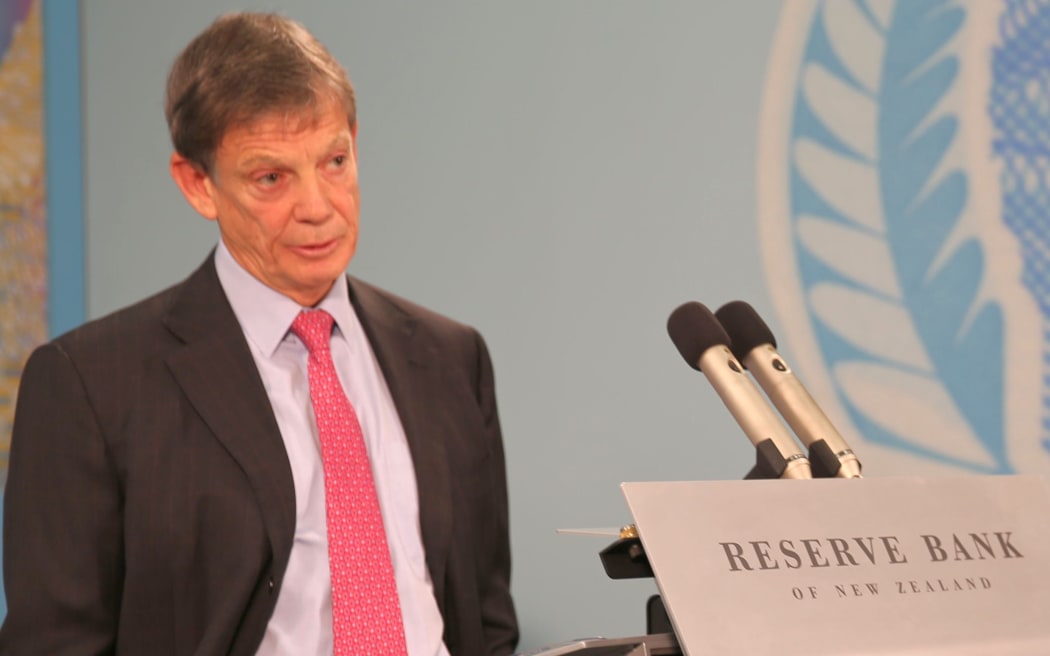Business reporters no longer get a heads-up on interest rate announcements from the Reserve Bank because one reporter broke the rules. How is it affecting the media?

The man behind the ban - Reserve Bank governor Graeme Wheeler was "extremely disappointed" by the leak. Photo: RNZ
On Thursday, the Reserve Bank made its latest announcement on the official cash rate (OCR) and journalists were in the dark.
For the past 18 years, accredited reporters have been given the Reserve Bank’s decision early, on the understanding they will not disclose it before the official announcement. But this time journalists covering the announcement didn’t get their usual heads-up.
On 14 April, The Reserve Bank had announced the media would be locked out of lock ups for the foreseeable future after discovering its mid-March OCR was leaked by a reporter from Newshub, the newsgathering operation of Mediaworks, which owns TV3 and several radio networks.
Journalists argued the move would make mistakes in reporting more likely.
As if to prove the point, on Thursday Newshub got the OCR wrong by a factor of 100, breaking the incorrect figure on Twitter.
Mediaworks obviously really needed those RBNZ lockups. 225%?! pic.twitter.com/o3vyraxhhs
— Chelsea Armitage (@chels_armitage) April 27, 2016
Why the big secret?
The OCR is information that can move financial markets. Someone with advance knowledge of a change - or no change - could make a lot of money, or make a lot of problems.
When the March leak was revealed, the Reserve Bank ordered an investigation and identified the Mediaworks' employee as the source. The investigation found the reporter sent the information to a number of Newshub staff before the official announcement, though it found no evidence the leak had any impact on the financial markets.
MediaWorks chief executive Mark Weldon, formerly the head of New Zealand's stock exchange, said his company "unreservedly apologised" for a failure within its news department, had co-operated with the investigation -and had already made changes.
Blanket ban puts noses out of joint
Arguments that Mediaworks alone should be excluded from lock-ups fell on deaf ears, leading to reporters from other organisations directing their wrath at the company.
Fairfax’s Media’s Hamish Rutherford said MediaWorks has not given any real account of what went wrong.
"It owes a better explanation of what exactly it gets up to. If MediaWorks is not prepared to front up about its systems, before or after this episode, why should it be trusted to follow the rules elsewhere?"
In the National Business Review (NBR), Jenny Ruth wondered how many more times a leak might have happened in the past - a question neither asked or answered by the Reserve Bank's inquiry.
The New Zealand Herald's John Drinnan said the lock-up ban marked the end of an era for New Zealand media and a system which relied on trust.
There were fears Treasury would follow suit with the Budget later this month, and to report something as dense as a Budget an advance briefing is crucial to be up to speed on the day.
The fears were allayed last week when Treasury chief executive Gabriel Makhlouf sent journalists a note (touchingly signed off "Regards, Gabs") confirming they would still get a sneak peak of the Budget. But he warned them:
"I will continue to review both the overall status of future Budget briefings, and the ability of organisations to attend, in light of the adherence to lock-up conditions.
"I trust you can see the value in observing embargo conditions, to ensure this mutually beneficial practice can continue."
Mere inconvenience - or thin end of wedge?
The NBR’s Rob Hosking has attended Reserve Bank briefings since the lockups began in 1998. He said the trust built up between the Reserve Bank and journalists was "trashed by Mediaworks".
"This embargo was a contract, agreed for the mutual benefit of parties concerned," Rob Hosking told Mediawatch.
"This was a failure of integrity".

Rob Hosking Photo: supplied
"This is a retrograde step. Having the time to absorb the information has improved the quality of economic debate in New Zealand."
Mr Hosking wrote to the Reserve Bank urging them to reconsider lock-ups for bone fide financial reporters and analysts, but to no avail.
"I have some sympathy with the Reserve Bank, but they have long-term relationships with people in those lockups [who] they know do the job seriously," he said.
In the NBR, he wrote:
"There is now a general tendency to treat journalists who have been covering monetary and economic matters for up to two decades – or some cases more - on roughly the same level as say 20-something journalists who wouldn’t know the 90 day rate from Ninety Mile Beach."
"I don't believe the (Mediaworks) reporter is solely or even mainly at fault. There were older heads who should have been wiser who were involved," he said.
While Newshub made a mistake when tweeting Thursday's decision, the Reserve Bank was spot on with its tweet at 9am on the dot.
Official Cash Rate unchanged at 2.25 percent. More soon.
— Reserve Bank of NZ (@ReserveBankofNZ) April 27, 2016
One minute later, it tweeted a link to an official statement quoting the governor explaining the decision. It even had its own video explaining the OCR:
So are journalists now largely redundant when such information is released?
For debating and discussing decisions, we're not redundant at all," said Mr Hosking.
"I don't the think the Reserve Bank sees it that way, but there is a sense that they don't trust some journalists now.
"There was an asset base of trust built up with all journalists that has been damaged by a cowboy news orgranisation - and a Reserve Bank that has reacted too crudely."

